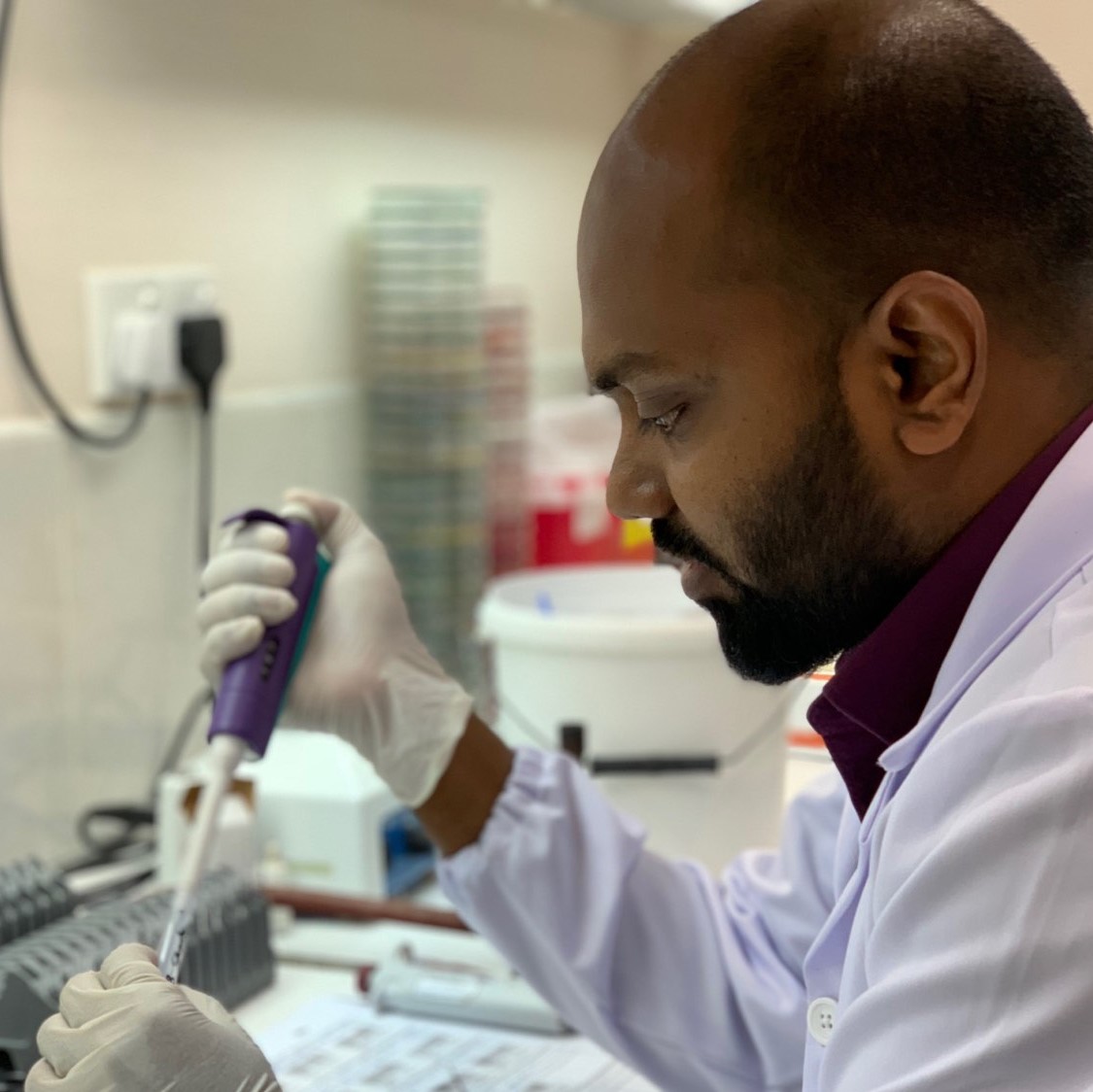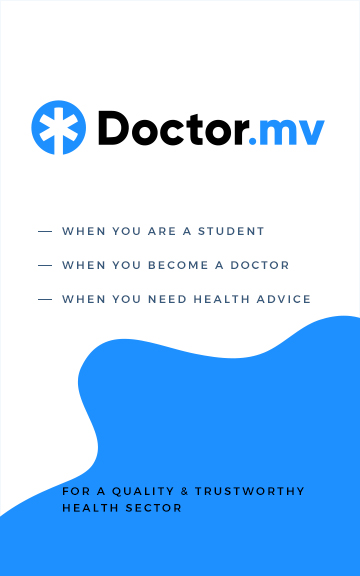An Inspection with Mohamed Jazeel (Laboratory Scientist)

What are the experiences you went through to get to where you are today?
When I was in school, I did not know what working in a laboratory was about. I then gained an interest into this field after studying Microbiology and Chemistry during my A’Levels. But I did not know what kind of career opportunities I had in this field, or even how to reach them.
I met a few students studying Nursing in Addu. Since I was interested, I asked them a lot about working in a laboratory. Even though they answered the questions, they didn’t know studying opportunities that were available in capital Male’. So, I stopped pursuing this career since I could not find enough information.
After graduating from Higher secondary school, I joined Kooddoo Fisheries Complex and worked in the Engineering Department. At this stage of my life, I did not know what my career choice was going to be, or what I was going to do my further studies on.
I came across a course list published by the Maldivian National University (MNU), and I decided to apply for the Primary Health Care course.
Later on, I decided to apply for the Diploma in Medical Laboratory Technology course after my cousin sent me some information regarding it. At that time, there was no bachelor’s degree available in this field, hence, I decided to apply for this course as well.
Luckily, I was accepted into both the courses. I opted to go for the Diploma in Medical Laboratory Technology, and this is how I got into this field.
After completing the 2.5 years Diploma program, I joined ADK Hospital. This was in 2013. I then decided to change my workplace to Hulhumale’ Hospital after 3 months. I joined IGMH in 2015, and completed by bachelor’s degree while working there.
What is your role as a Laboratory Scientist?
The laboratory contains different departments/sections. These include Microbiology, Clinical Pathology, Hematology, Biochemistry, Serology, Blood bank and Phlebotomy.
My job is to work in all these sections. The employees follow a rotation-wise schedule. Since, there are so few Technicians/Scientists working in the laboratory, we all have to work in each section every week.
Our task for each day is to process all samples taken during our shift. Morning shift employees process all samples taken until 14:00, while afternoon shift employees process all samples that are taken until 23:00. After issuing the reports for each sample, our work for the day is complete.
What are the key differences between a Laboratory Technician and a Laboratory Scientist?
It all depends on where you achieve your certificate from. In Western countries, graduates are referred to as Medical Laboratory Scientists. However, graduates in Asia are referred to as Medical Laboratory Technicians/Technologists.
The work we do in the laboratory are very much related to science. Every day is spent on doing experiments and tests.
What are the common trends you notice in our community?
I have noticed that a lot of Maldivian women are anemic. This means that they have a lack of Red Blood cells in their bodies. The reasons for this needs to be researched and studied. One reason could be the eating patterns and habits we have adopted.
Moreover, Vitamin-D deficiency is also common. One other trend is the increasing number of people with non-communicable diseases.
In your opinion, what could be done to improve the Healthcare industry of the Maldives?
I think hospitals need to work to improve the unity between laboratory staff, doctors, nurses, x-ray technicians and physiotherapists.
I do not notice teamwork inside the hospital. However, I have noticed that the health centers in the islands have better teamwork among their staff.
Someone needs to initiate and take responsibility in order for us to improve this. Us laboratory staff need to establish a good partnership between doctors and nurses in order to care for the patient better.
While doctors are examining the patient, we are running the tests. Nurses are the ones who take the sample. This sample has a direct correlation with how our analysis turns out. And based on this, the patient is treated. As a result, if we work better with nurses and doctors, we can improve the patient care we give.
What advice would you give to someone that wants to pursue a career in your field?
I look forward to the day where more students pursue a career in this field. In the Maldives, our field lacks locals, especially males. When I first started studying, I had 5 other boys in my class. By the time graduation came, I was the only one left.
This course is tough. In my opinion, out of all the courses that are being taught at MNU, next to MBBS, Medical Laboratory Science course is the most difficult. A lot of students that start this course drop out at some point, and a lot of them have gone on to become teachers, nurses and lawyers.
However, many do not understand how interesting this course really is. Even in the hospital, the laboratory is hidden from view, located at the corner. This could be a reason why students are not interested in this field.
When I was in college, we used to hold Open Day events. Even now at IGMH, every year we invite students to visit the laboratory and we show them the work we do. Furthermore, a job structure is being designed by the government for those working in this field, so we expect to get a good salary in the future.
Are their safety measures you take inside the laboratory?
Safety inside the laboratory is one of our main priorities. The most common instruments we use are lab coats and gloves. These are provided by the hospital.
When we were studying in university, the lecturers taught us all the safety measures we had to take inside a laboratory. By the time we joined the hospital, we know what measures we need to take.
Every laboratory must have safety policies and guidelines. Yet, when working in the laboratory we tend to ignore occupational health and safety. One example is the long hours we spend sitting down in front of the computer and the effects it has on our health.
Who are your biggest inspirations in this field?
My lecturers who worked tremendously for us. The Laboratory Science degree was introduced in the Maldives due to their efforts.
I would like to mention Ms. Maharath, who was my lecturer. She was a big factor behind my success.
A misconception that a lot of people have is that inside a laboratory all the work is handled by a machine. That all we need to do is place the sample inside the machine.
This is far from the truth. We cannot do these tests without knowing all the information of the patient. For example, due to the way a sample was taken from a patient, the machine reading might show increased levels of potassium, even when it could actually be normal. If we do not do further research and analysis, the patient might be treated wrongly and this could lead to more problems for the patient. Hence, we cannot issue a report just based on the machine’s results.
Is there anything else you would like to add?
My hope is that Doctor.mv and others work to improve this field in the Maldives. Help us attract more students to pursue a career in this field.
Moreover, for MBBS students and graduates, I would like to suggest to consider specializing in this field. Currently in the biggest hospital in the country, we do not have a Hematologist consultant. There is no Maldivian Microbiologist consultant as well. Nor a Transfusion medicine specialist.
Inside the laboratory, we have a lack of personnel to guide us and help us. There are only 3 people that have achieved a Master’s degree working in the laboratory. In my opinion, a laboratory should have a Master’s graduate in every section at least. We consistently need to be updated and keep on learning in this field. Hence, we need their help.
The day when we have these specialists available is a day I look forward to. It is going to help this field advance and grow.
I also thank Doctor.mv and their young team for giving me this opportunity and for the work that they are doing.



Leave a comment
0 Comments